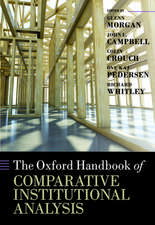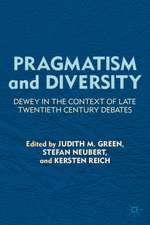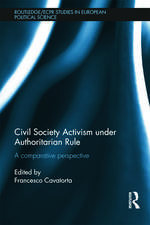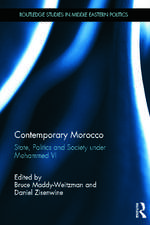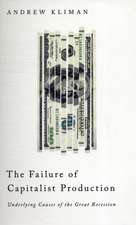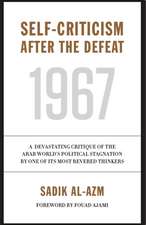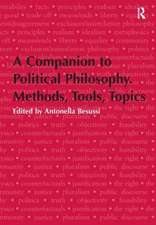Stable Outside, Fragile Inside?: Post-Soviet Statehood in Central Asia
Editat de Emilian Kavalskien Limba Engleză Paperback – 30 noi 2016
| Toate formatele și edițiile | Preț | Express |
|---|---|---|
| Paperback (1) | 478.59 lei 43-57 zile | |
| Taylor & Francis – 30 noi 2016 | 478.59 lei 43-57 zile | |
| Hardback (1) | 1054.71 lei 43-57 zile | |
| Taylor & Francis – 28 feb 2010 | 1054.71 lei 43-57 zile |
Preț: 478.59 lei
Nou
Puncte Express: 718
Preț estimativ în valută:
91.58€ • 95.87$ • 75.77£
91.58€ • 95.87$ • 75.77£
Carte tipărită la comandă
Livrare economică 07-21 aprilie
Preluare comenzi: 021 569.72.76
Specificații
ISBN-13: 9781138254367
ISBN-10: 1138254363
Pagini: 252
Dimensiuni: 156 x 234 mm
Greutate: 0.36 kg
Ediția:1
Editura: Taylor & Francis
Colecția Routledge
Locul publicării:Oxford, United Kingdom
ISBN-10: 1138254363
Pagini: 252
Dimensiuni: 156 x 234 mm
Greutate: 0.36 kg
Ediția:1
Editura: Taylor & Francis
Colecția Routledge
Locul publicării:Oxford, United Kingdom
Notă biografică
Emilian Kavalski is Associate Professor of Global Studies at the Institute for Social Justice, Australian Catholic University (Sydney). He is currently working on (i) the encounter of International Relations with life in the Anthropocene, especially the conceptualization of and engagement with non-human actors; and (ii) the nascent Asian normative orders and the ways in which they confront, compliment, and transform established traditions, norms, and institutions. Emilian contends that in both these areas the application of Complexity Thinking has important implications for the way global life is approached, explained, and understood. At the same time, these research foci sketch a prolegomenon to the conceptual contexts of theory-building and policy-making intent on facilitating economic, social, and environmental interactions that promote the well-being of people in ways that are just, equitable, and sustainable.
Cuprins
The international politics of fusion and fissure in the awkward states of post-Soviet Central Asia, Emilian Kavalski; Part 1 Analytical Perspectives on the Post-Soviet Statehood of Central Asia: Applying the democratization literature to post-Soviet Central Asian statehood, Paul Kubicek; The problems of the 'clan' politics model of Central Asian statehood: a call for alternative pathways for research, David Gullette; The international political economy of Central Asian statehood, Martin C. Spechler and Dina R. Spechler; Central Asian statehood in post-colonial perspective, John Heathershaw. Part 2 Insights from the Processes of Localization in the Dynamics of Central Asian State-Making: International democratic norms and domestic socialization in Kazakhstan: learning processes of the power elite, Kirill Nourzhanov; International agency in Kyrgyzstan: rhetoric, revolution and renegotiation, Claire Wilkinson; The limits of international agency: post-Soviet state building in Tajikstan, Lawrence P. Markowitz; Turkmenistan: flawed, fragile and isolated, Steven Sabol; Stalled at the doorstep of a modern state: neopatrimonial regime in Uzbekistan, Alisher Ilkhamov; Bibliography; Index.
Recenzii
'This book successfully demonstrates that the experience of state-building should not be conceived teleologically as a civilizing process. Contextualizing the evolutionary experience of state-formation in Central Asia, the authors of this volume highlight, persuasively and shrewdly, that this region is increasingly subject to a paradox involving external stability and domestic fragility.' Marlene Laurelle, Johns Hopkins University, USA 'This collection of high-quality studies provides detailed overviews of relevant scholarship as well as a comprehensive introduction to selected empirical topics. It is thoroughly grounded in the theoretic academic literature that it impressively reviews, criticizes and extends on the basis of particular studies of the region on its own terms.' Robert M. Cutler, Carleton University, Canada 'This is one of the first books to try and analyse the region as a political whole. Because of the hopeless visa regimes which persist in Central Asia, it is almost impossible for one person to get to know all five countries intimately... This is therefore a very useful comparative analysis of five similar, but also very different, countries in what we think is a homogenous region...' Asian Affairs 'This volume is [...] welcome; the conversation it crystallizes is long overdue. Emilian Kavalski has assembled a group of top-notch Central Asia specialists, who contribute both empirical detail and theoretical value... each chapter is entirely worth reading on its own... Readers who know what questions to ask will benefit tremendously from reading this book. Others will read this volume differently, sticking to individual chapters and limiting their learning to what each independently provides. Either way, the book provides a tremendous service in generating a long-overdue conversation about weak statehood in the region - a topic that will remain relevant for the foreseeable future.' Acta Politica '... one will find insights in this work, especiall
Descriere
This timely volume analyses the quality of statehood in Central Asia by assessing the complex dynamics of Central Asian state-making and focusing on the simultaneous patterns of socialization and internalization in the region - thus bringing Central Asia into the mainstream of systematic interrogation.

